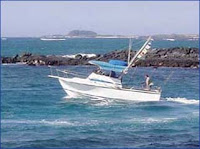 Years ago, we went to Hawaii and the friends with us wanted to go deep-sea fishing. We rented a charter boat and the skipper took us back and forth on the ocean, at a high speed, without any change in speed or direction, except to turn around for each run. I wasn’t seasick, but I can remember feeling trapped by the relentless movement. No change, no variation. It was awful. What was the point? And we didn’t catch anything either.
Years ago, we went to Hawaii and the friends with us wanted to go deep-sea fishing. We rented a charter boat and the skipper took us back and forth on the ocean, at a high speed, without any change in speed or direction, except to turn around for each run. I wasn’t seasick, but I can remember feeling trapped by the relentless movement. No change, no variation. It was awful. What was the point? And we didn’t catch anything either.In Acts 27, Paul is traveling to Rome in a ship as a prisoner. The wind is high so they stop for a while, but because the ship’s owner is pressured to get where he is going, they set out again. Before they set sail, Paul told them, “I perceive that this voyage will end with disaster and much loss, not only of the cargo and ship, but also our lives.” No one listened.
At first the wind seems to be in their favor, but a stronger wind comes up and “no small tempest beat on us, all hope that we would be saved was finally given up.” The crew became desperate. To lighten the ship, they threw as much cargo overboard as they could, including the ship’s tackle. They had not eaten and were deeply fearful for their lives, everyone but Paul.
As the ship tossed in the storm, Paul spoke again. He told them there would be no loss of life, only the ship, and that they would run aground on an island. He also explained how he knew all that, “For there stood by me this night an angel of the God to whom I belong, and whom I serve . . . .” He’d had a vision, and this time they listened.
Paul’s perception in his first warning was fairly accurate; the voyage was going to be a disaster, but he didn’t have all the details. He thought lives would be lost. The angel who appeared to him corrected that perception.
Human discernment is part observation, part prior knowledge, and part intuition or hunch. When I discern something, my mind has gathered everything I see and know, then adds a ‘gut-feeling’ and comes up with what I think is true or will happen. Sometimes I hit it right, but from experience and this story, I know that I am not correct all of the time. Paul was an astute man, close to God and wise in the ways of things, but his perception was not perfect either.
In Paul’s mind, the obvious conclusion to this situation was disaster. In my mind, the obvious outcome to many situations seems negative too. I cannot see how something positive or good can come from what looks like a no-hope, no-win calamity. When faced with one of those, even if an angel gave me a vision, I’m not sure I’d buy it.
However, the Lord is the only one who knows past, present, and future perfectly. He understands fully the events that have happened and why. He knows what is going on and what will happen tomorrow. He may not always tell me, but if I need to know, I can depend on what He says.
In the middle of a storm, with no hope in sight, and without a vision from an angel, trusting the Lord becomes difficult, but there is something positive about a life-storm—at least they make me cry out to God for help, and He always answers.
I have more trouble doing that when the trip is like that Hawaiian fishing expedition. Things are happening at a relentless pace, but it seems like I’m not accomplishing anything. I become numb, feel trapped, and just want it over with, done. I don’t see any purpose in what I am experiencing, and like Paul, my perception predicts only disaster.
At that point, I’d love to see what the angels see.
No comments:
Post a Comment